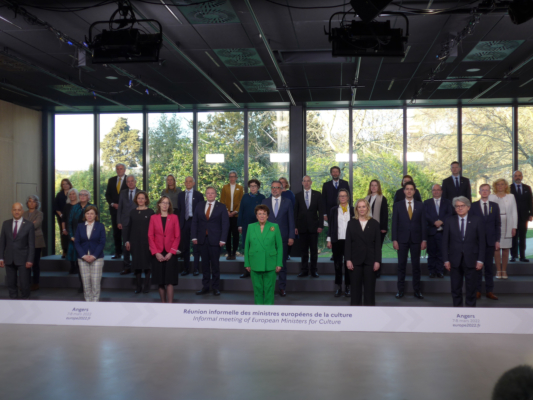 Credit: MCULT
Credit: MCULT
On Monday 7 and Tuesday 8 March 2022, Luxembourg's Minister of Culture, Sam Tanson, took part in the informal meeting of European Ministers of Culture and Audiovisual in Angers, France, as part of the French Presidency of the European Union (EU).
The ministers first discussed the situation in Ukraine, with Ukrainian Culture Minister Oleksandr Tkachenko joining them by videoconference to update them on the current state of affairs. Deploring the destruction of cultural heritage and the growing disinformation campaigns, he called the latter weapons of mass destruction and stressed that there is not only a battle on the ground, but also a battle of wits. He therefore called on his counterparts, on the one hand, to counter the spread of disinformation and, on the other hand, he expressed his hope to be able to cooperate with the Member States of the EU in the immense task of protecting and then rebuild the Ukrainian cultural heritage, insisting that Ukraine was born in Europe and will remain faithful to its European values.
In response, Member States strongly condemned the Russian aggression and expressed their solidarity with the Ukrainian people. In this spirit, the ministers adopted a joint European declaration which:
- recalls their attachment to the democratic values on which Europe is founded,
- marks their ambition to support Ukrainian artists and cultural professionals to enable them to continue their work creative,
- expresses their mobilisation in favor of freedom of expression and information, and
- underlines their determination to safeguard Ukrainian cultural heritage.
In this respect, the Minister Tanson, particularly highlighted the immediate commitment to Ukrainian cultural heritage and the essential mission of supporting a free press, saluting in passing the courage of Russian journalists and citizens who demonstrate their opposition, despite the heavy penalties they incur.
The situation in Ukraine also accompanied the debates during the three other informal working sessions in Angers. Under the audiovisual component, the ministers focused on the future of the media in Europe and access to European content on the internet. They highlighted the need for reading criteria to detect disinformation, the link between maintaining media pluralism (including regional, local and public), their financing and strengthening their resilience in the face of economic, geostrategic and scanning, etc. In terms of accessibility to European cultural content, the question of online search algorithms and the development of the necessary skills were particularly highlighted by the ministers.
During a working session on trafficking in cultural property, it was the specific question of the implementation at European level of an action plan aimed at strengthening measures to combat this scourge which was at the center debates. The ministers welcomed this proposal, emphasising the increased need for consistency and coordination in this area, particularly in terms of the traceability of cultural goods, the improvement of information flows on trafficked goods and the exchange of good practices.
In this respect and recalling the provisions of the recently adopted law on cultural heritage, Minister Tanson affirmed that Luxembourg is firmly committed to the fight against the degradation of cultural property: "When we talk about the illicit trafficking of cultural property, it is obvious that this traffic passes from one border to another and does not stop within our borders. The proposed action plan is therefore important to unite our forces, but we must also acquire the necessary means to carry it out and work in close cooperation with the countries of origin from which the goods which are the subject of illicit trafficking come”.
Finally, the ministers again focused on the enhancement of European heritage, with discussions focusing on digitilisation and the European initiatives already in place, such as the European digital library or the European heritage label which the ministers wish to strengthen and make even more more visible in the future. Acknowledging the strategic role that cultural heritage plays for European identity and the need to bring Europeans ever closer to this heritage, which moreover is not something set in stone, Minister Tanson also warned against the risks of overstrain of cultural heritage. As such, she recalled that any enhancement must also be able to be reconciled with the protection of heritage against the impacts of climate change and crises, because the damage they cause to heritage is irreversible.








